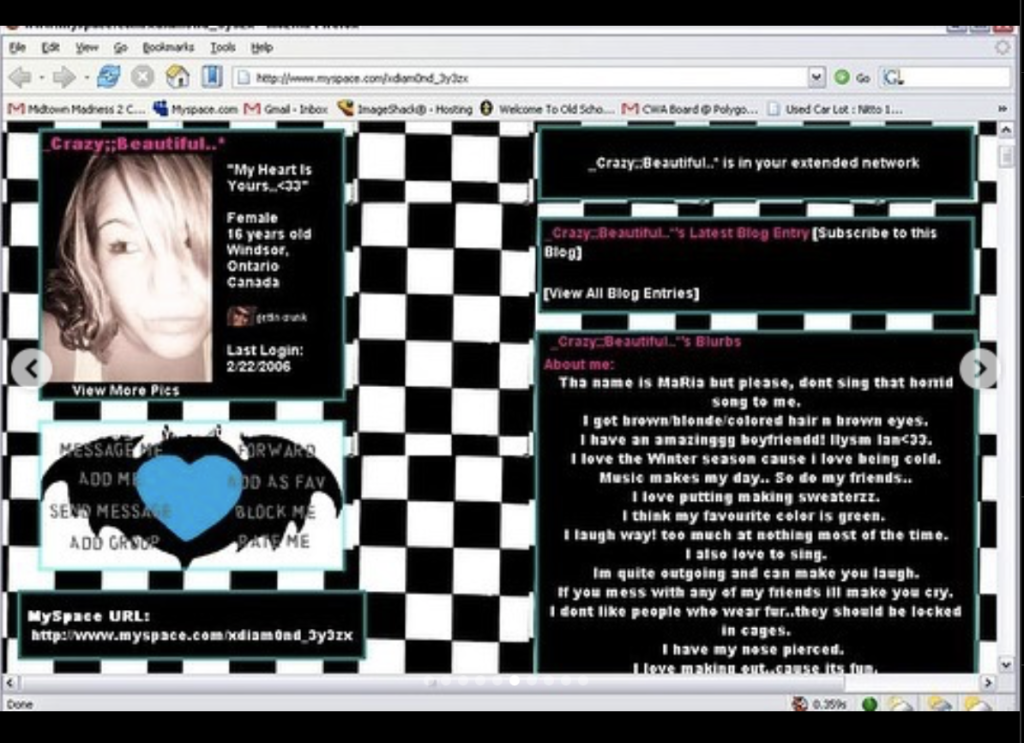In the early 2000s, the Internet experienced an upsurge of social media platforms that forever changed the way we connect to each other. Friend-based social media, like MySpace and Facebook being the dominants of the field. These social media platforms were created to help people connect to their friends and family, to share personal updates via different formats – text posts, picture albums, checking into locations visited and so on. Over the years, however, we have seen the evolution these platforms have experienced. Social media platforms, as we once knew them as friend-based, have changed significantly. Largely inspired by a post on Business Insider, titled “Great news- social media is falling apart” , this post looks at this change and what characterises social media platforms nowadays.

Layout of Myspace, posted by Instagram user laguna_biotch
The Rise of Facebook and MySpace
As stated, early to mid 2000s saw a rise of platforms like Facebook and MySpace, both of them being giants in this industry. They allowed users to create profiles and connect with friends by sharing details of their lives. What started as a new form of communication and way to form friendships and even relationships, turned into specific curations of ourselves in the digital world.
What contributed to the downfall of friend-based social platforms?
- The endless possibilities that the world wide web brings us. People soon learned how to utilise these platforms by curating their profiles to attract more people, this way starting relations to people who reached beyond their friend and family circles.
- Information overload. Additions of public figure pages, ads and news added to the overwhelming increase in content that oftentimes is not relevant to the user. Instead of going to Facebook for updates from our friends, we are met with content that we never signed up for. “We-thought-you-might-like-this” does not always represent our interests and it can be quite overwhelming to consume all the content that’s in front of us.
- Changes in algorithms. This one can be illustrated the best by the changes Instagram has made over the years in their algorithm.1 It pushes content that is deemed “popular”, it pushes forward influencers and reels. Now it has gotten a bit better because people have a choice to opt for the type of “sort by” of their home feed. Friend-based social media relied heavily on chronological feeds, where users saw posts from friends in the order they were shared. On the other hand, many modern platforms use complex algorithms that prioritise content based on user behaviour and engagement. While these algorithms aim to provide a more personalised experience, they often limit the visibility of posts from friends, which adds to the decline in friend-based social media.
- Change of user demographic. As the newer generations are entering the digital world, different perspectives and priorities are being seen. More visually aesthetic, more in align with ones political views, more entertaining the content has to be.
Where are we now?
The evolution of social media is an ongoing process and as with everything, while we can make predictions, none of it is written in stone. While non-friend-based social media sites are more popular, it does come with some benefits.
- Niche Communities. Many users are gravitating toward smaller, niche-based platforms where they can connect with people who share specific interests, hobbies, or values (think of platforms like Discord).
- Increased Privacy. With growing concerns about data security and privacy, we can expect more platforms to emphasise user control and data protection.
- Mixed-Media Content. Platforms that offer a mix of text, images, and short videos are likely to remain popular, as they cater to a variety of user preferences.
In conclusion, the era of friend-based social media, as we once knew it, has passed. While platforms like Facebook and MySpace laid the foundation for social networking, the digital landscape has evolved significantly. Today, social media is much more diverse, with a focus on visual content, privacy, and algorithms shaping the user’s experience. Therefore, it is making me wonder: do platforms, centred more in regard to profits and not the connection aspect of human experience, representative of people? Where do you think people will express themselves digitally in the future? Is this the demise, not only of friend-based social media platforms, but also social media as a whole?
- How does Instagram work? https://about.instagram.com/blog/announcements/shedding-more-light-on-how-instagram-works ↩︎


Recent Comments